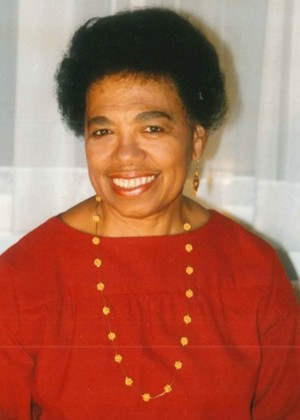TWU honored to host the archives of Dr. Lela Llorens

Lela Llorens, PhD, OTR, FAOTA, named one of the 100 most influential people in occupational therapy by the American Occupational Therapy Association, also was an influential force on the Texas Woman’s School of Occupational Therapy. As host of her archives, TWU continues to celebrate her many achievements and contributions.
Llorens received numerous awards and highest accolades in occupational therapy, including the Eleanor Clark Lectureship. The first African American to be honored as a Slagle Lecturer, she delivered her lecture to a segregated audience in Dallas, Texas, in 1969.
Her relationship with TWU began with Dr. Ruth Pershing, former director of occupational therapy, who was a classmate and friend of Llorens at Western Michigan University. When Pershing became the director, she opened opportunities for African American students to do clinical work in Texas. Because of this friendship and kinship, Llorens established lasting ties with TWU.
Llorens was TWU’s first Vanderkooi Endowed Lecturer in 1993, and she was instrumental to the development of the occupational therapy PhD program.
“Lela stressed the idea that the advanced doctoral program have a theoretical base and not be a collection of courses without an overarching framework,” says Kathlyn Reed, PhD, OTR, MLIS, FAOTA, Associate Professor Emeritus.
According to Reed, although Llorens’ work was based on a developmental approach, the Occupational Adaptation model is, in part, an outgrowth of her recommendations.
/prod01/twu-cdn-pxl/media/images/occupational-therapy/Llorens-Archives-900-x-600.jpg)
This ongoing collaboration led to Llorens sharing her personal papers with TWU, which are archived and carefully preserved in the Blagg-Huey Library in Denton, Texas.
Llorens’ archives provide a rich history from which we can all learn.
/prod01/twu-cdn-pxl/media/images/occupational-therapy/Llorens-Archives-410-x-420.jpg)
“We can look at Lela’s history and her values to guide us today,” says Regina Campbell, OT, MA, FAOTA, Associate Professor Emeritus.
Campbell met Llorens 53 years ago during her own affiliations (Fieldwork II) and has maintained a relationship with her to this day.
“If you look at the context of Lela’s life, being an African American woman during the Civil rights movement, being an occupational therapist during the disability rights movement and going into the evidence based movement, we see that she was an innovator and influencer,” Campbell says. She further points out that the challenges young occupational therapists face today are not all that different from those experienced in the past.
The volume of the archives and the care Llorens has taken to organize and preserve her historical papers, letters and personal artifacts demonstrates her lifelong commitment to learning.
In her words, “Knowledge isn’t knowledge, unless it’s shared.”
Page last updated 2:11 PM, October 28, 2025